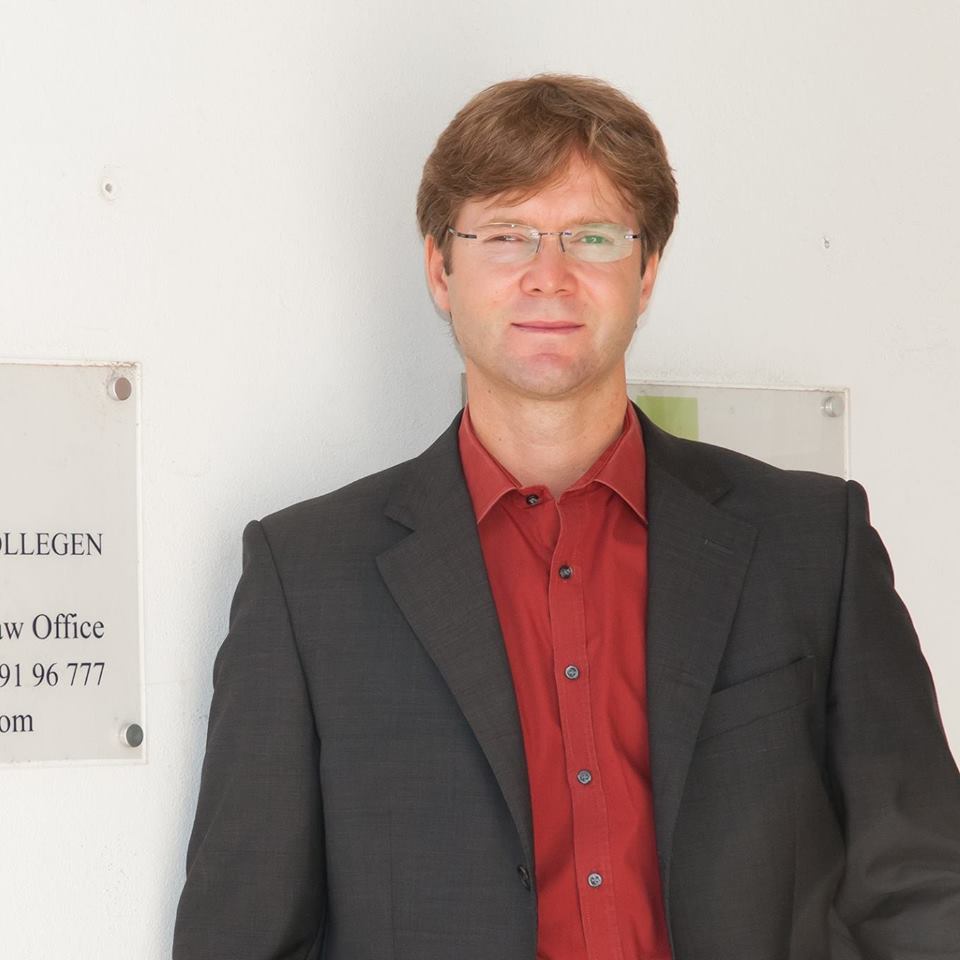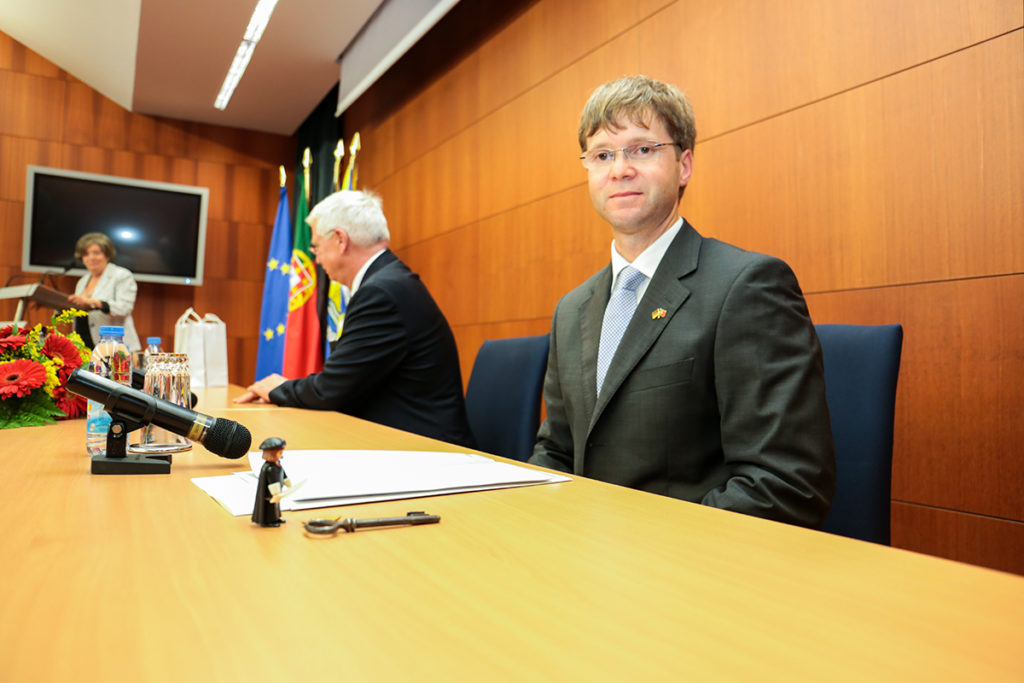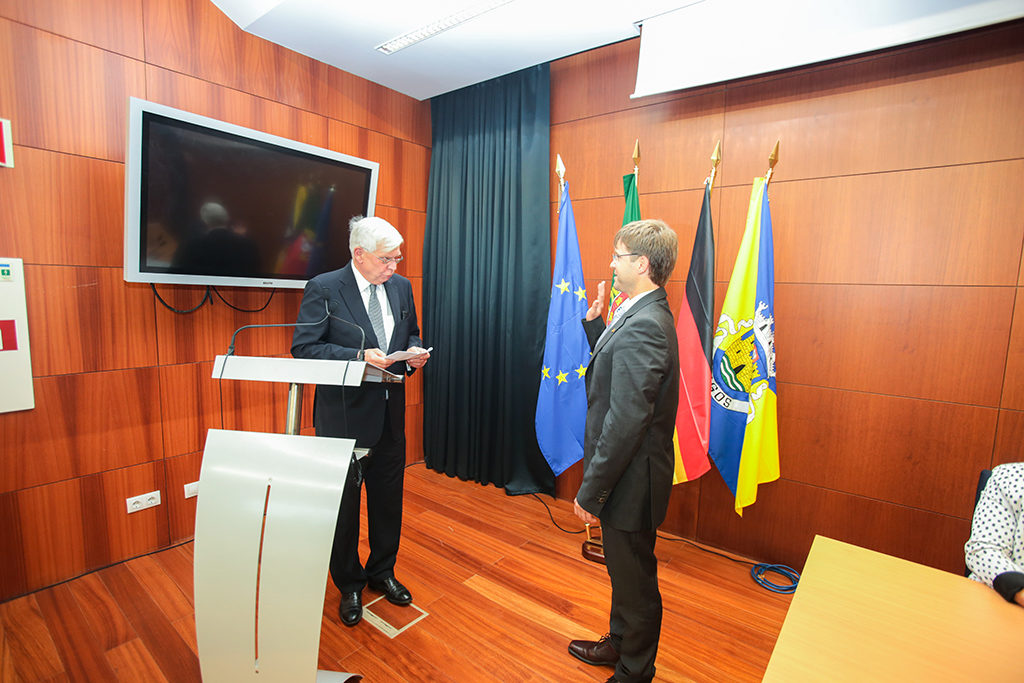 Alexander Rathenau, the new honorary consul of the Federal Republic of Germany in the south of the country, laments the lack of entrepreneurship in the Algarve and says the region has the potential to attract young Germans.
Alexander Rathenau, the new honorary consul of the Federal Republic of Germany in the south of the country, laments the lack of entrepreneurship in the Algarve and says the region has the potential to attract young Germans.
In an interview with Sul Information, Alexander Rathenau says that most Germans in the Algarve are retired, something that links him to "a problem across Europe: that not many young people dare to go abroad to live and work there".
«There are always very interesting areas, lawyer, journalist or tax consultant, we in the Algarve only have one German-speaking consultant. People don't have the courage to go abroad,” he added.
But if younger Germans don't leave their country much, Rathenau laments, on the other hand, the lack of entrepreneurship in the Algarve region. “There are few people who want to invest in new technologies, for example. Everything focuses on tourism. And whoever works in that area, works for a few months and then, for the rest of the year, they work in low-income jobs».
Also for Germans who grow up in the Algarve, the consul considers it desirable that they continue to live here. Most, however, return to Germany, looking for better opportunities, "which is a pity, as it is usually not even true".
«I notice that many Portuguese [emigrants] who have children in Germany, of the second or third generation, had a very negative image of Portugal and never wanted to leave there». But when the children come to their parents' country, they are perplexed: «This is so modern, Portugal has many things that are very progressive».
The consul himself, who was born in Germany but came to Portugal at the age of six, identifies more with the region than with his country of origin. «If you used the German word “Heimat” [hometown/place where you feel at home] it would be the Algarve».
The new honorary consul considers that, since the opening of the consulate in Lagos, there has been a good feedback of German citizens in the Algarve. "The majority of Germans undoubtedly live in Barlavento, between Carvoeiro and Sagres," said Rathenau, adding that the same happens in Alentejo, where many Germans have chosen the coastal area to live. Therefore, for Rathenau, Lagos is better than Faro to install the consulate, for reasons of proximity. «Of course there is always someone from Tavira or Vila Real de Santo António who says “now I have to travel so far”, but I think it's fair because it's better for most».
This is the first time since the 25th of April 1974 that the Consulate is based in Lagos. “There is no official rule that says Lagos must have a diplomatic representation and that the consul must work there. If I am the honorary consul, I decide where I work. Of course the embassy has to approve of this decision, if I worked somewhere in the deep Alentejo, it would be bad, because everyone would have to travel there. There is a new consul, who lives in Lagos, so the consulate is based in Lagos too».
There are no official figures, but Rathenau estimates that there are at least 6000 Germans residing in the Algarve. «The question is: How to define “residence”? There will probably be more than 10 if we include those who have not registered, or who spend a few months in Germany».
The Consulate's jurisdiction covers the districts of Faro, Beja, Évora and Setúbal, where there will be «certainly a few thousands» of Germans. «After all, our clients are also those who come to the Algarve as tourists, which, during the summer months, represents an increase of several thousand people who could potentially be our clients».

As for the integration of his compatriots in Portugal, Alexander Rathenau considers that “many Germans live isolated and only meet Germans”. But the fault, according to him, is also the Portuguese, because «they are not so open, direct, to invite a German home or include him in their closest friends. Until a German and a Portuguese manage to build a friendship it can take years and, even so, they will be an exception».
The main barrier is language: especially for those coming into retirement age, learning a new language is difficult. Another problem “is that many Portuguese prefer to respond in English, even when trying to speak Portuguese. Naturally, that way there is no communication in Portuguese».
Even so, the consul thinks that there is more interest in learning the language from the Germans than from the English, for example. “The English behave as if they were in England, they speak English immediately, without even asking if the other person understands. The Germans first ask “Do you speak English?, I also know how to speak a little Portuguese”».
The German Consulate in the Algarve has existed since 1752. There are investigations that conclude that the German consulate is the oldest diplomatic representation in Portugal. «Hamburg merchants founded the German consulate in the XNUMXth century in Faro. Naturally, most commerce at the time was done by sea and Faro it was an important port city». In that century, there were even three consulates, in Vila Real de Santo António, Faro and Lakes. At that time, it was important to have diplomatic representatives in the ports”, to “guarantee security conditions for the goods, because there were many pirates coming from North Africa that hindered the activity of the traders”.
“Nowadays, the Consulate naturally has very different functions,” recalls Rathenau. "We handle many notarial matters, signature recognition, address recognition." The Consulate also issues passports and travel passports. "If you are here as a tourist and lose your wallet with the documents that identify you, we can issue you an identification document immediately so you can return to Germany."
Unlike consuls general, who have embarked on a diplomatic career, an honorary consul has certain restrictions. "I was appointed because I grew up in the region, because I know the conditions and because it is not feasible for the embassy to establish a consulate that is not just honorary." An honorary consul is not salaried, but he may be paid through fees he may require for certain actions. But what a consul in these conditions earns does not cover expenses. "It means that I have to pay a large part of the expenses out of my pocket," reveals Alexander Rathenau.
Regarding Germans who live an alternative lifestyle, mainly in the Alentejo and the Algarve mountains, the consul understands «completely this lifestyle, which often has nothing to do with lack of money, it is a personal option». The relationship between these communities and the Portuguese population is good, and does not consider the lifestyles to be very different. «I have Portuguese friends who live in the deep Alentejo, who also have a simple mud house, without water, just well water».
“There was a time, about a year ago, when the issue of problematic children was very present, those children who were taken in by precisely these families hippies", remember. The consul admits that there was some criticism by the Portuguese, in court, but also in the medium, « simply because these children might not learn the important things for their education. But that too is not very relevant and the justice has already been dealing with it».
German version of the interview:

Alexander Rathenau, der neue Honorarkonsul der Bundesrepublik Deutschland, sieht an der Algarve Potenzial, aber meint es werde zu wenig investert
In the interview für Sul Information, sagt Alexander Rathenau, dass die meisten Deutschen at der Algarve Rentner sind. «Was an der Algarve fehlt, das finde ich auch schade, aber das ist ein algemeines Problem in Europa, dass sich zu wenig junge Menschen trauen, ins Ausland zu gehen um dort geschäftlich tätig zu werden. Es gibt ja immer sehr interesting Arbeitsfelder wie Rechtsanwalt, Journalist oder Steuerberater, wir haben an der Algarve eigentlich nur einen Steuerberater, der Deutsch spricht. Es gibt Kunden en masse für Steuerberater. Man traut sich aber nicht ins Ausland zu gehen'. Er meint es sei schade, dass es an der Algarve so wenig Unternehmer gibt. «Es konzentriert sich alles auf den Tourismus. Die Meisten die im Tourismus arbeiten, haben ein paar Monate viel zu tun, und müssen dann die restlichen Monate irgendwelche Geringverdienerjobs annehmen. Es gibt doch hier viel grösseres Potenzial, Dienstleistungsbetriebe, zum Beispiel'.
Auch wer an der Algarve aufwächst sollte, seiner Meinung nach, hier bleiben. Die meisten kehren aber nach Deutschland zurück, und hoffen auf bessere Aussichten, was 'schade ist, weil meistens stimmt das garnicht'. «Was mir auffällt ist dass viele Portugiesen, die Kinder die in Deutschland haben, teilweise in der zweiten oder dritten Generation, eine ganz andere, falsche Sicht hatten was Portugal betrifft. Die kommen kaum zurück». Aber wenn die Kinder kommen, seien sie ganz perplex: 'Portugal ist ja ganz modern, die haben hier viele Sachen die vortschrittlich sind, und es ist schön'.
Rathenau wurde in Deutschland geboren, aber ist mit sechs Jahren nach Portugal gekommen. «Wenn man das deutsche Wort “Heimat” verwendet, dann ist das für mich die Algarve».
Since then Konsulat in Lagos geoffnet wurde habe es ein positives Feedback gegeben. “Die meisten deutschen Residenten leben, ohne Zweifel, an der Westalgarve, sagen wir zwischen Carvoeiro und Sagres”, sagt Rathenau, und fügt hinzu, dass ebenfalls in Alentejo mehr Deutsche an der Westküste leben, als im Inneren. Für Rathenau ist Lakes besser als Faro, weil es näher an der deutschen Gemeinschaft liegt. «Natürlich gibt es immer irgendjemand, der in Tavira oder in Vila Real de Santo António wohnt und sagt “jetzt muss ich so weit fahren”. Aber wenn mann es gerecht sieht, dann ist es tatsächlich für die meisten besser'.
Es ist das erste Mal seit dem 25. April 1974 dass das Konsulat sich in Lagos befindet. «Es gibt nicht wie bei den Behörden ein Motto, dass es in Lagos ein Grundbuchamt geben muss, und deswegen muss dann auch der Grundbuchbeamte dort arbeiten, nein. Also wenn ich der Honorarkonsul bin, dann entscheide ich erstmal, wo ich dann arbeite. Natürlich muss die Botschaft und das Auswärtige Amt dem zustimmen, wenn ich irgendwo im tiefsten Alentejo arbeiten würde, wäre es schlecht, weil dann alle dorthin fahren müssten. Neuer Honorarkonsul, der in Lagos seinen Sitz hat, deswegen ist das Konsulat auch nach Lagos gezogen».
Es gibt keine offiziellen Daten, aber Rathenau schätzt dass es mindestens 6000 Deutsche gibt, die an der Algarve permanent wohnen. «Die Frage ist, was ist Residenz. Diejenigen, die das ganze, Jahr über hier sind, die hier fix leben, sind, schätze ich, mindestens 6000. Wer nach Portugal zieht sollte sich nach drei Monaten an der Gemeinde anmelden, aber viele tun das nicht, weil es keine Pflicht gibt. Das Amtsbezirk des Konsuls geht bis zum Tajo, wo es "auf jeden Fall einige Tausende gibt". 'Unsere Kunden sind ja auch diejenigen, die als Turisten herkommen, das heißt, wenn man die noch dazuzählt haben wir natürlich in den Sommermonaten viele, viele Tausende die potenziell unsere Kunden sind'.
Alexander Rathenau findet, dass viele Deutsche 'sich doch etwas isolieren, sie treffen sich nur mit Deutschen, oder deutschsprachigen Personen'. Daran seien aber auch die Portugiesen teilweise schuld, weil sie «nicht so offen sind, direkt, um, sagen wir mal, einen Deutschen zum Beispiel nach Hause einzuladen, oder als Teil seines engen Freundeskreises zu betrachten. Bis ein Deutscher und ein Portugiese eine enge Beziehung aufbauen, können Jahre vergehen, und es ist eher ein Ausnahmnefall'. Die größte Barriere sei die Sprache, besonders weil viele Deutsche erst im Rentenalter kämen, in dem es schwehr sei, eine neue Sprache dazuzulernen. Ein weiteres Problem «besteht auch darin, dass viele Portigiesen auf Englisch antworten, auch wenn man versucht Portugiesisch zu sprechen. Dann kommt natürlich keine Kommunikation auf Portugiesisch zustande'. Trotzdem findet Rathenau, dass Deutsche eher dazu geneigt seien, die Sprache zu lernen, mehr als die Engländer, zum Beispiel. «Der Engländer tut alles, als wäre er in England. Sie sprechen sofort Englisch, ohne zu fragen, ob die andere Person das versteht, sie nehmen das einfach an als wäre es selbstverständlich. Die Deutschen würden ersteinmal fragen “Do you speak English? Ich spreche auch ein Bisschen Portugiesch”, und dann gibt es zumindest ein paar Wörter auf Portugiesisch”.
Das Konsulat an der Algarve existiert seit 1752. Laut Rathenau, gäbe es Recherchen die besagen dass deutsche Konsulat die älteste diplonatische Vertretung in Portugal sei. «Hamburgische Kaufleute haben im 18. Jahrhundert die diplomatische Vertretung gegründet in Faro🇧🇷 Damals war es natürlich so, dass das meiste über den Seeweg ging, sodass man in Faro als Anhaltspunkt einen Anlauf hatte». In diesem Jahrhundert habe es drei Konsulat, in Vila Real de Santo António, Faro und Lakes. 'Damals ging is a die Sicherung der Waren, weil von Afrika gab es viele Banditen die den Geschäftsleuten das Leben schwer machten. A den Schutz der Seeleute zu gewähren, gab es diese Vertretungen'.
'Heutezutage hat das Konsulat natürlich ganz andere Funktionen', meint Rathenau, 'wir machen viele notarielle Handlungen, Unterschriftenbeglaubing, Beglaubungen von Abschriften. Auch andere Sachen wie die Passausschtellung, auch Ausschtellung von Reiseausweisen. Wenn Sie als Turist hier sind, und Sie verlieren Ihren Geldbeutel mit Ihren Ausweisdokumenten, können wir hier ein Ausweisdokument ausstellen damit Sie weiterreisen können, oder zurückreisen konnen nach Deutschland. Und darüberhinaus hat der Honorarkonsul auch repräsentative Funktionen».
Im Gegenteil zu Burufskonsulen, die eine diplomatische Laufbahn eingeschlagen haben, hat ein Honorarkonsul bestimmte Beschränkungen was die Tätigkeit betrifft. Er kann, wenn er eine Handlung vertritt, eine Gebühr verlangen, “aber die Kosten überschreiten die Einnahmen die ich habe. Das heißt, dass ich einen Großteil der Kosten aus eigener Tasche bezahle'.
Was die Deutsche betrifft, die, hauptsächlich in Alentejo, einen sehr alternativen Lebensstil haben, so habe Rathenau «volles Verständnis für diese Lebensweise, die oft nichts damit zu tun hat, das sie kein Geld haben, es ist des lebenrens Entscheid , dass sie keinen grossen Wert auf Vermögensgegestände legen, und nur ihre Ruhe haben wollen'. Er denkt, die Beziehung zwischen diesen Gemeinschaften und den Portugiesen sei gut, und eigentlich know der Lebensstil nicht so anders. "Ich hebe einige portugiesische Freunde die im tiefsten Alentejo wohnen, die haben auch ein ganz einfaches Haus aus Lehm, haben meistens kein richtiges laufendes Wasser, sonder nur einen Brunnen".
«Es gab so eine Zeit, vor einem Jahr, from the war das Thema von den schwer erziehbaren Kindern, die gerade in Portugal von solchen Hippiefamilien aufgenommen wurden, sehr stark präsent. Da gab es eine gewisse Kritik von Portugiesen, in der Justiz, aber auch von den Medien, einfach weil diese Kinder in diesen Familien vom scheinen nach nicht gut aufgehoben waren, weil sie nicht erfahren wast für ihre Erzie. Das ist aber eher Meinungsabhängig, und es ist mittlerweile auch nicht mehr so stark, es wurde ein Bisschen eigeschränkt durch die Justiz'.
Marc Gorzelniak he is a finalist student in the 3rd year of the Degree in Communication Sciences, at the School of Education and Communication of the University of Algarve – this interview was prepared as part of his curricular internship at the newspaper Sul Informação


















Comments